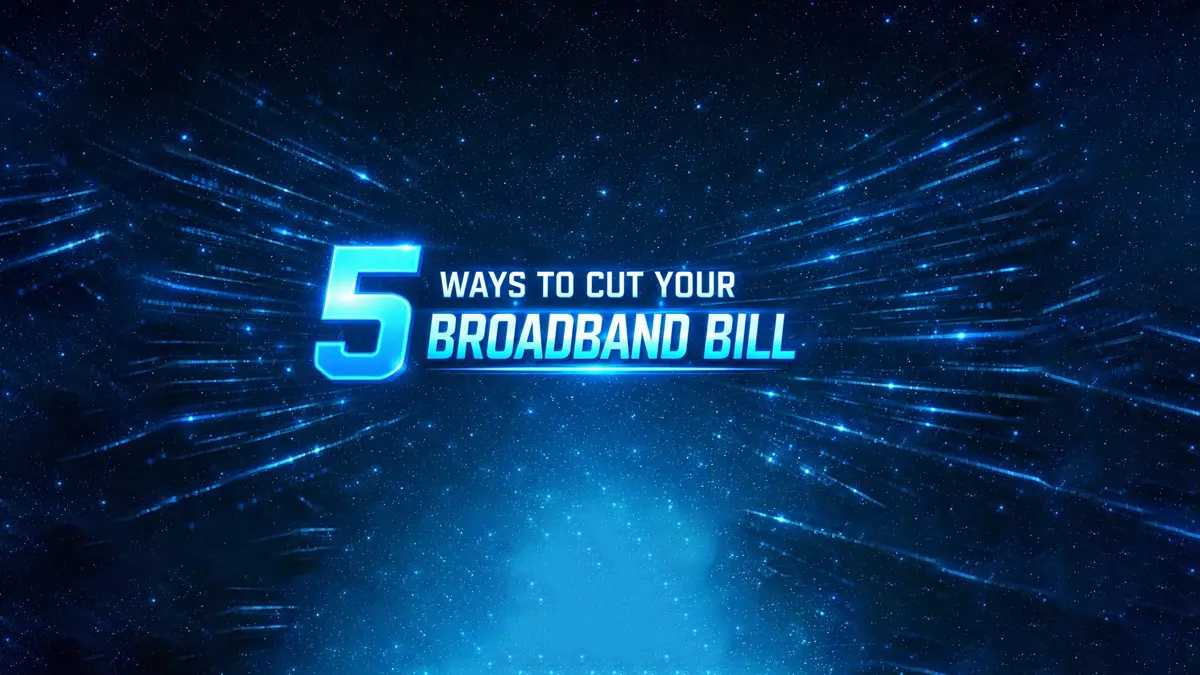5 WAYS TO CUT YOUR BROADBAND BILL
WITHOUT CHANGING PROVIDER
THE LOYALTY PENALTY
It is a known fact in the industry: existing customers pay more. If you have been with your provider for more than 18 months, you are likely paying 30% to 50% more than a new customer. However, switching isn't always convenient. Whether you are in the UK or the USA, here are five proven ways to lower your monthly outgoings without changing your ISP.

1. THE RETENTIONS HAGGLE
This works in both the UK and the US. Your provider has a specific department called "Retentions" (UK) or "Customer Loyalty" (USA). Their only job is to stop you leaving.
The Script: Call them and say, "I am thinking of leaving because [Rival Provider] is offering a cheaper price."
- UK (Virgin/Sky): They usually have "retention offers" that are not advertised publicly. You can often get £10-£20 knocked off immediately.
- USA (Xfinity/Spectrum): Ask for a "promotional rate reset". Agents often have the power to put you back on the new customer pricing for another 12 months.
2. LOW INCOME SUPPORT
If you are claiming government benefits, you might be legally entitled to a cheaper tariff.
🇬🇧 UNITED KINGDOM: SOCIAL TARIFFS
If you receive Universal Credit, Pension Credit, or other benefits, you can access "Social Tariffs". These are special plans from providers like BT, Virgin, and Sky that cost between £12 and £20 per month. They are exempt from price rises and have no exit fees.
🇺🇸 USA: LIFELINE & LOW COST PLANS
While the Affordable Connectivity Program (ACP) ended in 2024, the Lifeline program still provides a monthly discount for eligible households. Additionally, major ISPs offer their own low-income tiers, such as Comcast's "Internet Essentials" ($9.95/mo) or AT&T's "Access" program.
3. AUDIT YOUR SPEED
Are you paying for speed you don't use? Providers love to upsell "Gigabit" speeds (1000Mbps), but most households only need a fraction of that.
If you are a two-person household primarily streaming Netflix and browsing, 100Mbps is more than enough. Downgrading your package from 1Gbps to 100Mbps can save you £20/$30 a month instantly.
4. HARDWARE & RENTAL FEES
This varies massively between the two regions.
🇺🇸 USA: BUY YOUR OWN MODEM
In the US, many providers (like Xfinity) charge a monthly "modem rental fee" of $14-$20. You can legally buy your own compatible modem (e.g., Netgear or Arris) for $100. It pays for itself in 6 months and lowers your bill forever.
🇬🇧 UK: CANCEL "WIFI GUARANTEES"
In the UK, the router is usually free, but providers try to upsell "WiFi Guarantees" or "Boosters" for an extra £5-£10 per month. These are rarely worth it. Cancel the add-on and buy a cheap third-party WiFi extender from Amazon for a one-off cost instead.
5. UNBUNDLE & CUT THE CORD
Are you paying for a landline phone you never use? Or a TV package you barely watch? "Triple Play" bundles (TV, Phone, Internet) used to be cheaper, but streaming services have changed the game.
Check if you can switch to a "Broadband Only" (UK) or "Internet Only" (USA) plan. With the PSTN switch-off in the UK, landlines are becoming digital anyway. Ditch the line rental and use your mobile.
EFFORT VS SAVINGS CALCULATOR
Click a strategy to see potential annual savings.
| STRATEGY | DIFFICULTY | POTENTIAL SAVING |
|---|---|---|
| HAGGLING | MEDIUM | £120 / $150 |
| SOCIAL TARIFFS | HIGH (Eligibility) | £200 / $240 |
| SPEED AUDIT | EASY | £100 / $120 |
| HARDWARE | EASY | £60 / $180 |
FREQUENTLY ASKED QUESTIONS
CAN I HAGGLE MID-CONTRACT?
You can try, but you have less leverage. Haggling works best in the last 30 days of your contract when you are free to leave. If you are mid-contract, try removing optional extras like TV packs or boosters instead.
DOES BUYING MY OWN MODEM WORK WITH ALL US PROVIDERS?
Most cable providers (Xfinity, Spectrum, Cox) allow it and it saves money. Fiber providers (AT&T, Verizon) often require you to use their gateway, but they might not charge a separate rental fee. Always check your provider's "compatible devices" list.
ARE SOCIAL TARIFFS SLOWER?
Not usually. In the UK, most Social Tariffs offer standard fibre speeds (30-50Mbps), which is plenty for HD streaming and browsing. They are reliable connections, just cheaper.

SUMMARY: CHECK YOUR BILL
The easiest way to save money is to check what you are actually paying for. Are you renting a modem you don't need? Paying for 1000Mbps to browse Facebook? Spend 10 minutes auditing your bill today, and you could save hundreds this year.
